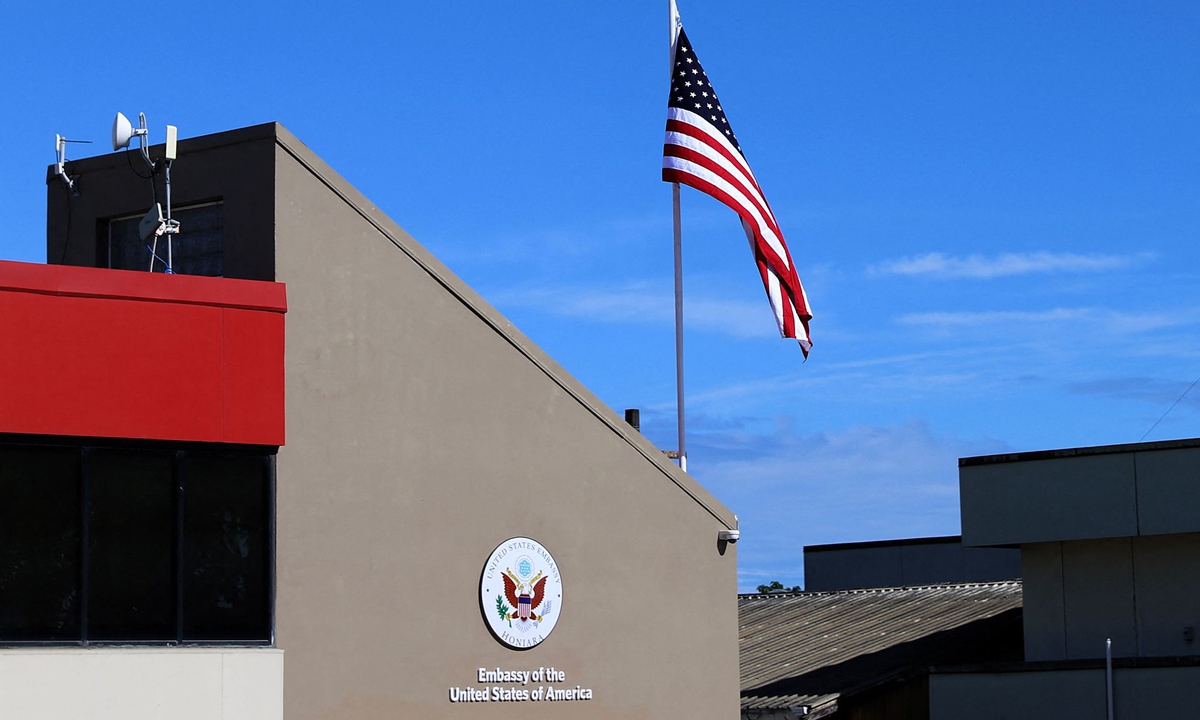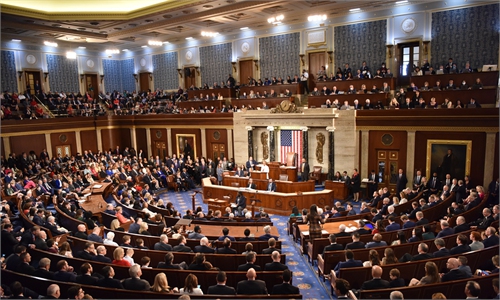China-South Pacific cooperation to withstand impact after US opens new embassy in Solomons

The national flag hangs above the US embassy building in Honiara, Solomon Islands on February 2, 2023. Photo: VCG
The US officially announced the opening of its embassy in the Solomon Islands on Thursday, in a move aimed at countering the development of ties between China and the South Pacific nation, Chinese analysts said. The move is a politically motivated action to serve the US' strategy of confronting China in the region, rather than one based on the need for consular services, so they believe the US will use the embassy to bring more disruption to the China-Solomons cooperation projects."China has no objection to the development of relations between South Pacific island countries and other nations, and we are willing to work with the relevant parties to use our advantages to jointly promote the development of the island countries," Mao Ning, a spokesperson of the Ministry of Foreign Affairs, said at a routine press conference on Thursday.
"China has no intention of competing with anyone for influence in the South Pacific region, and is not interested in geopolitical struggles," Mao said.
China will keep cooperating with the Solomon Islands and other countries in the region to improve economic development, public health, environmental protection and security for the local people, but also needs to take US influence into consideration more seriously when planning for future cooperation in the region, said experts.
US Secretary of State Antony Blinken announced plans to open a diplomatic mission in the Pacific island nation during a visit to the region in 2022. The last US embassy in the Solomons closed in 1993 amid post-Cold War budget cuts, and the US was represented there by an ambassador based in Papua New Guinea, Reuters reported.
According to a statement released by the US embassy in Papua New Guinea, "On February 2, 2023, the US of America officially announced the opening of its embassy in the Solomon Islands."
Blinken claimed in a statement released on Wednesday that "the opening of the embassy builds on our efforts not only to place more diplomatic personnel throughout the region, but also to engage further with our Pacific neighbors, connect US programs and resources with needs on the ground, and build people-to-people ties."
Although the US didn't openly mention China in its official statement, it's clear that the move is not based on a rising need for consular services, said Chen Hong, director of the Australian Studies Centre at East China Normal University.
"There are very few American citizens living or working in the Solomon Islands, and in the past, the US embassy in Papua New Guinea was enough to cover consular services in the Solomon Islands. But now, due to the need for strategic competition with China, the US will send more diplomats and other personnel to the region, so the opening of a new embassy is clearly a geopolitically motivated action," Chen told the Global Times.
Li Haidong, a professor at the Institute of International Relations at the China Foreign Affairs University, told the Global Times on Thursday that "It's not only the South Pacific region - US embassies all over the world, in the Middle East, Latin America, Africa, and Europe, have always disrupted China's cooperation with local governments from time to time."
In the past, the US refused to pay attention to regions like the South Pacific, and Washington is not interested in helping the people of these regions to develop, but in recent years, it has found that China's influence has grown rapidly in these regions and the local people and governments welcome China's presence, said experts. It is very obvious that the US is not sincere in helping these countries for development, but only care about "great power competition" with China, they noted.
"China has enough experience to withstand these impacts, and in the future, China will need to take US influence into consideration when planning more cooperation with the Solomon Islands and other regional partners, to make sure the cooperation won't be disrupted by the US," Li said.


